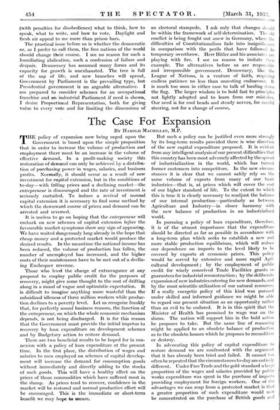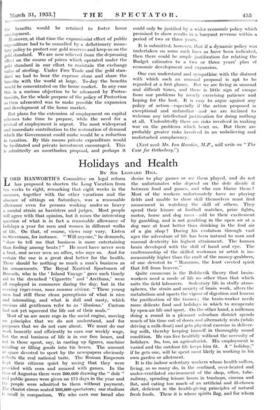The Case For Expansion
BY HAROLD MACMILLAN, M.P.
THE policy of expansion now being urged upon the Government is based upon the simple proposition that in order to increase the volume of production and employment there must be an increase in the volume of effective demand.. In a profit-making society this restoration of demand can only be achieved by a distribri- tion of purchasing power in wages, salaries, and business profits. Normally, it should occur as a result of new investment for capital extension, but in the conditions of to-day—with falling prices' and a declining market—the entrepreneur is discouraged and the rate of investment is seriously curtailed. To induce a revival of normal capital extension it is necessary to find some method by which the downward course of prices and demand can be arrested and reversed.
It is useless to go on hoping that the entrepreneur will embark on new schemes of capital extension before the favourable market• symptoms show any sign of appearing. We have waited dangerously long already in the hope that cheap money and a protected market would produce the desired results. In the meantime the national income has been reduced, the volume of production has fallen, the number of unemployed has increased, and the higher costs of their maintenance have to be met out of a declin- ing Exchequer revenue.
Those who level the charge of extravagance at any proposal to employ public credit for the purposes of recovery, might give some thought to the cost of drifting. along in a mood of vague and optimistic expectation. It is difficult to imagine anything more wasteful than the subsidized idleness of three million workers while produc- tion declines to a poverty level. Let us recognize frankly that, for perfectly sound business reasons, the function of the entrepreneur, on which the whole economic mechanism depends, is not being discharged. It is for this reason that the Government must provide the initial impetus to recovery by loan expenditure on development schemes and by Budgetary action to restore demand.
There are two beneficial results to be hoped for in con- nexion with a policy of loan expenditure at the present time. In the first place, the distribution of wages and salaries to men employed on schemes of capital develop- ment will increase the demand for consumption goods without immediately and directly adding to the stocks of such goods. This will have a healthy effect on the prices of those commodities which have suffered most in the slump. As prices tend to recover, confidence in the market will be restored and normal productive effort will be encouraged. This is the immediate or short-term -benefit we may hope to secure, But such a policy can be justified even more strongly by its long-term results provided there is wise direction of the new capital expenditure proposed. It is evident from any intelligent analysis of our present difficulties that this country has been most adversely affected by the spread of industrialization in the world, which has turned former customers into competitors. In the new circum- stances it is clear that we cannot safely rely on the same volume of exports from many of our basic industries—that is, at . prices which will cover the cost of our higher standard of life. To the extent to which this is true it is clearly necessary to readjust the balance of our internal production—particularly as between Agriculture and Industry—in closer harmony with the new balance of production in an industrialized world. . - In pursuing a policy of loan expenditure, therefore, it is of the utmost importance that the expenditure should be directed as. far as possible in accordance with a long-term plan which seeks to establish a new and more stable production equilibrium, which will reduce our dependence , on imports to the level likely to be covered by exports at economic prices.. This policy would be served by extensive and more rapid Agri- cultural development ; by the employment of public credit for wisely conceived Trade Facilities grants or guarantees for industrial reconstruction; by the deliberate expansion of new industries catering for new demands, and by the most scientific utilization of our natural resources. If a really , energetic policy of this kind was pursued under skilled and informed guidance we might be able to regard our.present situation as an opportunity rather than an evil to be endured. It is in this spirit that the Minister of Health has promised to wage war on the slums. The nation will support him in the bold action he proposes to take. But the same line of reasoning might be applied to an obsolete balance of production as to the obsolete houses which he proposes to recondition or destroy.
In advocating this policy of capital expenditure to restore demand we are confronted with the argument that it has already been tried and failed. It cannot too often be repeated that the circumstances to-day are entirely different. Under Free Trade and the gold standard a large proportion of the wages and salaries provided by public works expenditure was spent in the purchase of imports providing employment for foreign workers. One of the advantages we can reap from a protected market is that a greater proportion of such expenditure would now be concentrated on the purchase of British goods and the benefits would be retained to foster home employment. Morecver, at that time the expansionist effect of public expenditure had to be cancelled by a deflationary mone- tary policy to protect our gold reserves and keep us on the gold standard. We are now'relieved from the depressing effect on the course of prices which operated under the gold standard in our effort. to maintain the exchange value of sterling. Under Free Trade and the' gold stan- dard we had to bear the expense alone and share the benefits with the world at large. To-day the benefits would be concentrated on the home market. In any case this is a curious objection to be advanced by Protec- tionists, for the whole purpose of the policy of Protection as then advocated was to make possible the expansion and development of the home market.
But plans for the extension of employment on capital schemes take time to prepare, while the need for a revival of employment is urgent. The most widespread and immediate contribution to the restoration of demand which the 'Government could make would be a reduction in taxation. By this means private expenditure would be facilitated and private investment encouraged. This is admittedly an unorthodox proposal, and perhaps it could only be justified by a wider economic policy which promised to show results in a buoyant revenue within a period of two or three years.
It is submitted, however, that if a' dynamic policy was undertaken on some such lines as have been indicated, then there could be ample justification for relating the Budget estimates to a two or three years' plan of economic development and expansion.
One can understand and sympathize with the distrust with which such an unusual proposal is apt to be regarded at a first glance. But we are living in unusual and difficult times, and there is little sign of escape from our problems by merely exercising patience and hoping for the best. It is easy to argue against any policy of action—especially if the action proposed is exceptional and unfamiliar—and we are inclined to welcome any intellectual justification for doing nothing at all. Undoubtedly there are risks involved in making war on the problems which beset us. But there are probably greater risks involved in an unbelieving and undisturbed complacency.
(Next week Mr. Ian Ilorobin, M.P., will write on "The Case for Orthodoxy.")









































 Previous page
Previous page